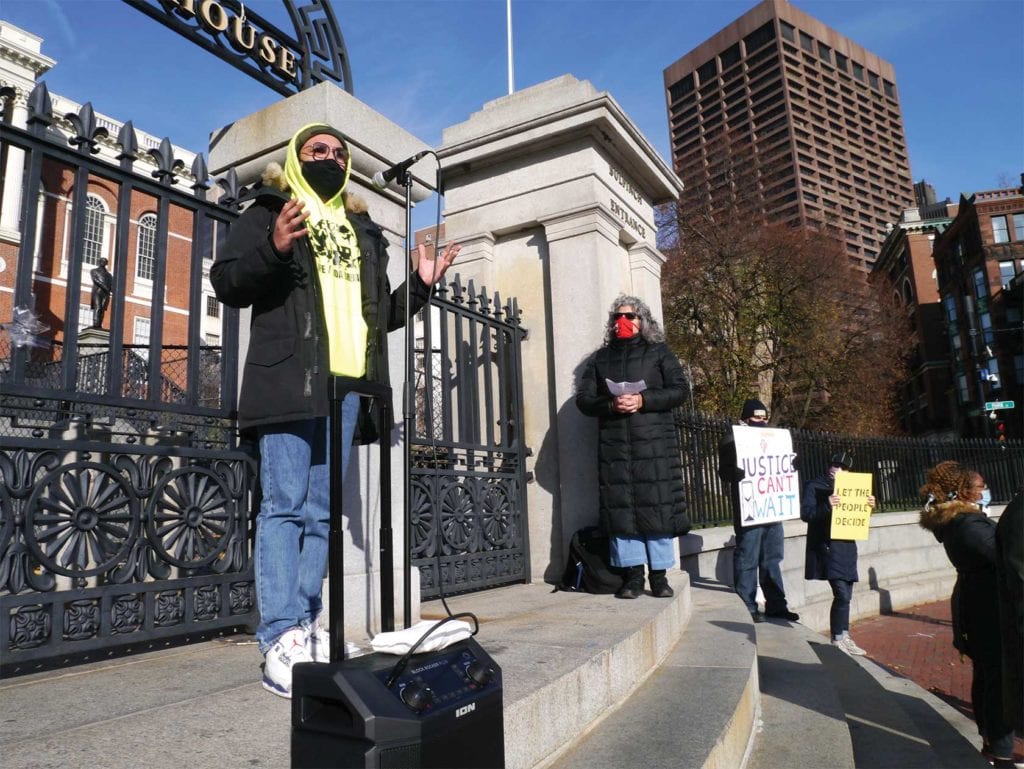Activists push legislation as budget debate winds down
Education funding, immigrant drivers’ licenses still stalled

Debates on the Fiscal Year 2021 budget in each branch of the state Legislature have come to a close, and legislators are getting ready for conference committees to start deliberating on a final product.
Activists have been following the process closely, and after the House of Representatives finished its debate, pushed for their amendments to pass in the Senate version.
At a demonstration at the State House last Thursday, several organizations joined together to appeal for remaining amendments and bills that are outstanding before the extended session ends on Dec. 31. Massachusetts Teachers Association President Merrie Najimy and union SEIU 32BJ Political Director Dalida Rocha hosted the rally.
Though the Senate budget uses a significant portion of the state’s rainy day fund, it does not increase Chapter 70 funding for public education, which was expected under Governor Charlie Baker’s education law signed in 2019.
“We need fully funded public education, with educators who look like our students, with a curriculum that validates and affirms their complex and multiple identities,” Najimy said.
As for amendments, legislators also took notice of the MBTA’s new proposal for service cuts this month and imposed their own restrictions through Amendment 152. The “Transit is essential” amendment doesn’t prohibit the service cuts planned for next year, but it does require them to use any new federal funding or new revenue to stop those cuts from happening.
Mela Bush Miles, the transit-oriented development director at Alternatives for Community and Environment, spoke in favor of continued transit service.
“We have got to get our Legislature to understand how desperate our situation is going to be if they do not act now,” Miles said. Though the MBTA cuts are temporary, she insisted that it will take too long to get bus drivers and their lines back.
A COVID-related amendment passed as outbreaks are increasing in jails and prisons in Massachusetts. Sen. Sonia Chang-Diaz filed the amendment, which creates more guidelines for the Department of Corrections when working to reduce harm and depopulate facilities during an outbreak.
“This amendment would require the DOC to pursue all pathways available, including medical parole, good time credits, stopping incarceration based on technical violations, and home confinement, where safe,” Chang-Diaz wrote in a statement. The amendment received support from District Attorney Rachael Rollins, Congresswoman Ayanna Pressley and several families of incarcerated individuals.
There was also a well-supported victory for abortion activists. The ROE Act, which increases protections surrounding abortion, was adopted as an amendment to the budget. There will be no 24-hour waiting period, no judicial bypass system for young people seeking abortions, and coverage will be established for those without health insurance.
Among other bundles of amendments, Amendment 389 will ensure access to all forms of rental assistance during the pandemic and Amendment 336 provides extra eviction protections. But an emergency paid-sick-time amendment was not adopted in either house. The amendment would have allowed more sick time for workers who experience outbreaks at their workplace and provide workplaces with the funding to do so.
In the conference committees, these amendments will later make it to the final version or be scrapped for a final time.
Other bills that are still up in the air for this legislative session are the police reform bills in both houses, the Housing Stability Act, and the Safe Communities Act that limits cooperation by local governments and police departments with ICE.
Rocha says that organizations are prepared to begin the process anew at the start of 2021.
“The plan is to refile in January … We know that some of these things won’t get done this session. We already started planning, so we’re not going anywhere,” she said.







